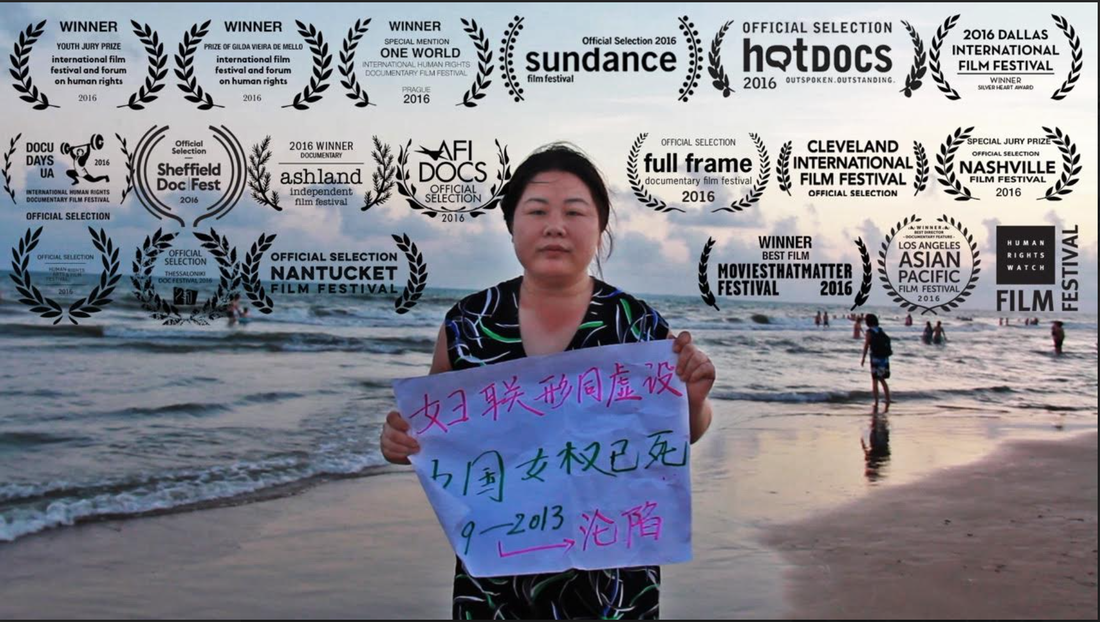
When director Nanfu Wang learned that her debut film “Hooligan Sparrow” had made the feature documentary Oscar shortlist last month, she was of course excited but also a little anxious.
Part political thriller, part travelogue, part character study, the film sheds unflattering light on China's secret police and, sure enough, within days of the Academy Award announcement, government authorities visited Wang’s family in China.
Speaking calmly by phone from her current home in Brooklyn, Wang says, “National security people had been monitoring me and told my family to warn me not to say anything negative about China.”
Wang began ruffling bureaucratic feathers in 2013, when she spent the summer documenting the travails of activist sex worker Ye Haiyan, a.k.a. Hooligan Sparrow.
Wang began ruffling bureaucratic feathers in 2013, when she spent the summer documenting the travails of activist sex worker Ye Haiyan, a.k.a. Hooligan Sparrow.
Enrolled at New York University's news and documentary graduate program, Wang read on the Internet about Haiyan's campaign to expose conditions in the country's notorious $2 brothels and decided to tackle the topic.
The day she landed in China, Wang abruptly shifted focus to a disturbing scandal unfolding in Hainan province.
The day she landed in China, Wang abruptly shifted focus to a disturbing scandal unfolding in Hainan province.
There, six elementary school girls were sexually violated by their principal and another man at a local hotel.
“Sparrow told me she was planning to protest the rape case and I realized at that point the story wasn’t going to be about sex workers anymore,” Wang recalls.
“The rape case became the trigger for a film that's really about how far the government goes to silence dissent.”
Wang traveled light.
Wang traveled light.
In her backpack she carried a Canon DSLR camera, a small point-and-shoot, a pair of glasses embedded with a tiny camera and an audio recorder.
It's all she needed to film the schoolyard demonstration where Sparrow brandished a sign reading, “Hey Principal, get a room with me and leave the kids alone.”
Shortly after the protest, Wang documented a group of unidentified men removing Sparrow from the apartment she shared with her 13-year-old daughter.
When Sparrow returned home, she was pressured to leave town.
“From there, we were basically on the run,” says Wang, who immersed herself in the story to the point where she too became part of the action.
Hounded throughout five Chinese provinces, Sparrow and her resilient child eventually found refuge in a rural village.
Hounded throughout five Chinese provinces, Sparrow and her resilient child eventually found refuge in a rural village.
Meanwhile, Wang herself became a target of government surveillance.
Standing outside a courtroom to film a hearing for human rights lawyer Wang Yu, Wang captured shaky hand-held footage of seeming civilians as they tried to grab her camera.
Later, authorities questioned Wang for five hours and demanded to see her footage.
The crafty filmmaker had already arranged for friends to smuggle her hard drives out of the country.
“I prepared a hard drive filled with a bunch of random landscapes that I'd filmed along the way, and that's what I gave to the authorities,” says Wang, who secretly recorded the interrogation.
“I prepared a hard drive filled with a bunch of random landscapes that I'd filmed along the way, and that's what I gave to the authorities,” says Wang, who secretly recorded the interrogation.
“The whole time they were questioning me, I couldn’t move and I felt like the recorder was burning my leg. Luckily, they didn't search me.”
Wang, who grew up in a small village, never even saw a documentary film until she moved to the U.S. at age 25.
Wang, who grew up in a small village, never even saw a documentary film until she moved to the U.S. at age 25.
The making of “Hooligan Sparrow” opened her eyes to stealthy forces that had been hiding in plain sight throughout her youth.
“It's like the movie ‘The Truman Show,’ where the guy realizes at the end of the movie his entire life was a lie. That's pretty much how I felt when I got involved in this protest and realized there were all these secret police on the streets monitoring people. Some of my old friends don't even believe what I tell them. They say, ‘You went to the U.S. for two years and now you come back and you're so critical!’”
After she returned to New York, Wang spent a year editing the raw footage, joined forces with executive producers Andy Cohen and Alison Klayman ("Ai Weiwei: Never Sorry") and watched “Hooligan Sparrow” become a sensation on the film festival circuit.
Looking back on her summer of living dangerously, she muses, “It was scary but from a documentary filmmaking standpoint, I'm grateful things happened the way they did. If I ended up making a story exactly the same as I imagined it at the start, that would be very boring. For me, this is the charm of documentary filmmaking.”
After she returned to New York, Wang spent a year editing the raw footage, joined forces with executive producers Andy Cohen and Alison Klayman ("Ai Weiwei: Never Sorry") and watched “Hooligan Sparrow” become a sensation on the film festival circuit.
Looking back on her summer of living dangerously, she muses, “It was scary but from a documentary filmmaking standpoint, I'm grateful things happened the way they did. If I ended up making a story exactly the same as I imagined it at the start, that would be very boring. For me, this is the charm of documentary filmmaking.”

Aucun commentaire:
Enregistrer un commentaire